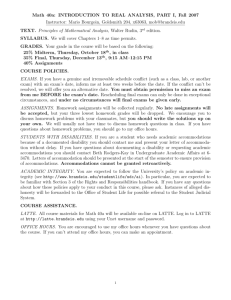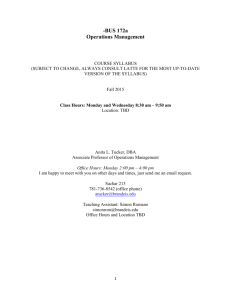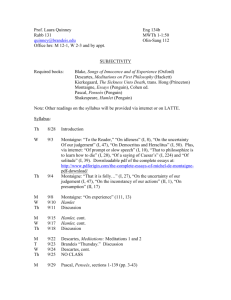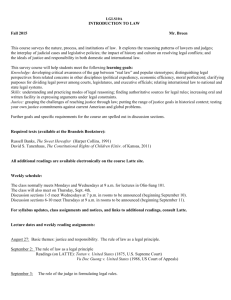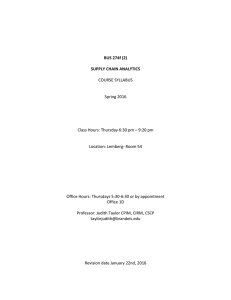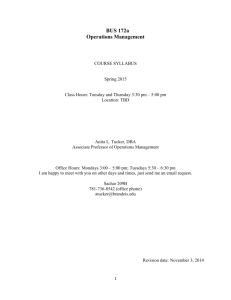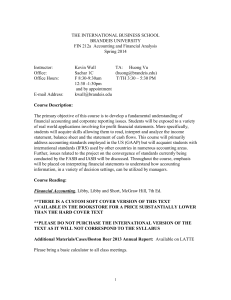Syllabus
advertisement
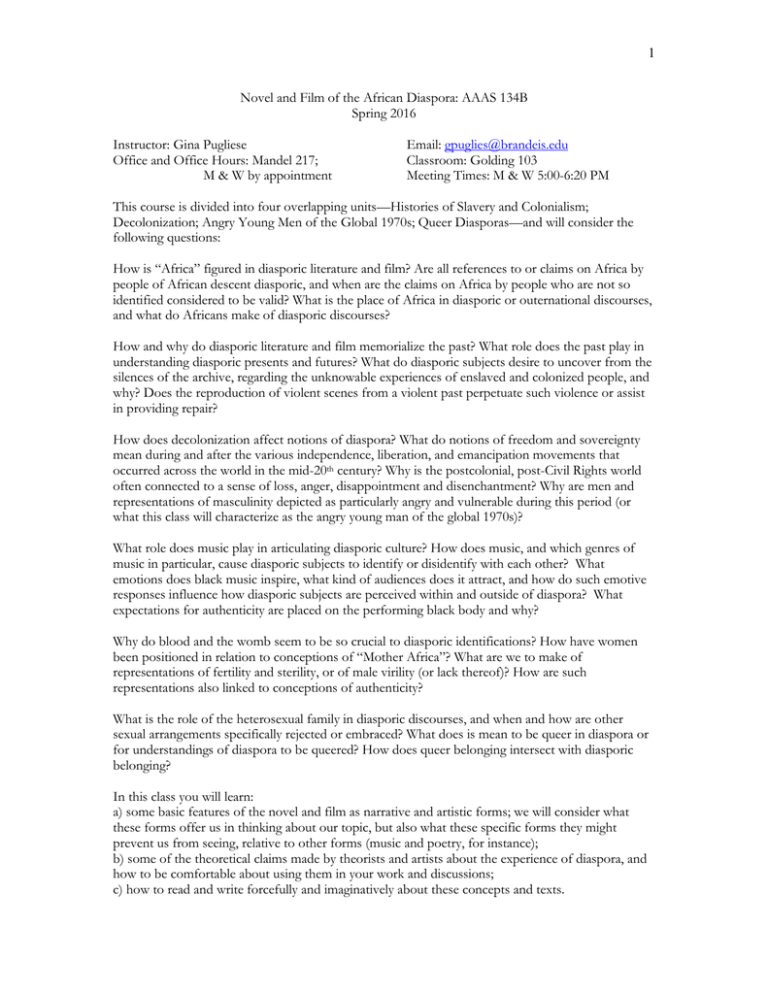
1 Novel and Film of the African Diaspora: AAAS 134B Spring 2016 Instructor: Gina Pugliese Office and Office Hours: Mandel 217; M & W by appointment Email: gpuglies@brandeis.edu Classroom: Golding 103 Meeting Times: M & W 5:00-6:20 PM This course is divided into four overlapping units—Histories of Slavery and Colonialism; Decolonization; Angry Young Men of the Global 1970s; Queer Diasporas—and will consider the following questions: How is “Africa” figured in diasporic literature and film? Are all references to or claims on Africa by people of African descent diasporic, and when are the claims on Africa by people who are not so identified considered to be valid? What is the place of Africa in diasporic or outernational discourses, and what do Africans make of diasporic discourses? How and why do diasporic literature and film memorialize the past? What role does the past play in understanding diasporic presents and futures? What do diasporic subjects desire to uncover from the silences of the archive, regarding the unknowable experiences of enslaved and colonized people, and why? Does the reproduction of violent scenes from a violent past perpetuate such violence or assist in providing repair? How does decolonization affect notions of diaspora? What do notions of freedom and sovereignty mean during and after the various independence, liberation, and emancipation movements that occurred across the world in the mid-20th century? Why is the postcolonial, post-Civil Rights world often connected to a sense of loss, anger, disappointment and disenchantment? Why are men and representations of masculinity depicted as particularly angry and vulnerable during this period (or what this class will characterize as the angry young man of the global 1970s)? What role does music play in articulating diasporic culture? How does music, and which genres of music in particular, cause diasporic subjects to identify or disidentify with each other? What emotions does black music inspire, what kind of audiences does it attract, and how do such emotive responses influence how diasporic subjects are perceived within and outside of diaspora? What expectations for authenticity are placed on the performing black body and why? Why do blood and the womb seem to be so crucial to diasporic identifications? How have women been positioned in relation to conceptions of “Mother Africa”? What are we to make of representations of fertility and sterility, or of male virility (or lack thereof)? How are such representations also linked to conceptions of authenticity? What is the role of the heterosexual family in diasporic discourses, and when and how are other sexual arrangements specifically rejected or embraced? What does is mean to be queer in diaspora or for understandings of diaspora to be queered? How does queer belonging intersect with diasporic belonging? In this class you will learn: a) some basic features of the novel and film as narrative and artistic forms; we will consider what these forms offer us in thinking about our topic, but also what these specific forms they might prevent us from seeing, relative to other forms (music and poetry, for instance); b) some of the theoretical claims made by theorists and artists about the experience of diaspora, and how to be comfortable about using them in your work and discussions; c) how to read and write forcefully and imaginatively about these concepts and texts. 2 Course Materials Required Texts Please purchase online or in the bookstore well in advance of the dates we are scheduled to read and discuss these books. Please, no ebooks. If you plan ahead and shop online, you can find very reasonable prices on books to buy or rent. Toni Morrison, Beloved (1987) Ngugi Wa Thiong’o, Wizard of the Crow (2006) Marlon James, A Brief History of Seven Killings (2015) Ama Ata Aidoo, Our Sister Killjoy (1977) Films (available on LATTE and at the Reserve Desk in the Library): REQUIRED RECOMMENDED Haile, Gerima, Sankofa (1993) Euzhan Palcy, Sugar Cane Alley (1983) Ousmane Sembène, La Noire De/Black Girl (1965) Steve McQueen, 12 Years a Slave (2013) Quentin Tarantino, Django Unchained (2012) Claire Denis, Chocolat (1989) Raoul Peck, Lumumba (2001) Ousmane Sembène, Faat Kine (2001) Claire Denis, 35 Shots of Rum (2008) Martine Atille, Dreaming Rivers (1988) Raoul Peck, Moloch Tropical (2009) Other films by Ousmane Sembene (Xala, Guelwaar, etc.) Kevin Macdonald, The Last King of Scotland (2006) Perry Henzell, The Harder They Come (1972) Issac Julien, Young Soul Rebels (1991) Melvin Van Peebles, Sweet Sweetback’s Baadasssss Song (1971) Issac Julien, BaadAsssss Cinema (2002) Julie Dash, Daughters of the Dust (1991) Issac Julien, Looking for Langston (1989) Jennie Livingston, Paris is Burning (1991) Marlon Riggs, Tongues Untied (1989) Lizzie Borden, Born in Flames (1983) Cheryl Dunye, The Watermelon Woman (1997) Readings on LATTE: Please check LATTE frequently throughout the semester to find new and updated materials. Additional required and recommended readings for this course will be uploaded to LATTE. You are expected to print these documents and bring them with you to class on the days they will be discussed. Failure to bring hard copies of readings to class will negatively affect your participation grade. Assignments Post Discussion Questions to LATTE At least once a week you are required to post a few (at least two) questions about the novels and/or films. Your questions should aim to engage your peers in a lively, thoughtful discussion about the novels, films, and general themes and concerns of the class. You are invited, but not required, to also use these posts to elaborate your own thoughts and responses to the texts. If it is difficult for you to share your thoughts in class, or you want to provide evidence of your engagement with the texts on days you are absent, posting your insights to LATTE is a good way to boost your participation grade. Periodic Quizzes I may elect to give pop quizzes at the beginning of class about the assigned films or novels. These quizzes will be factored into your overall participation grade. 3 Presentations Every student will give at least one presentation on a critical article about one of the films or novels we examine in class. After you are assigned a specific novel or film to research, you will independently locate a scholarly essay about the novel. The article you find through the Brandeis Library and Technology System (LTS) should be recent (written in the past 5 years). If you need assistance finding a good, recent article to use, please seek help from me or any of the humanities research librarians. During your 15-20 minute presentation you will identify the article’s thesis, summarize the main arguments and analytical points of the article and provide a handout or PowerPoint presentation for the class that offers the general outline of your presentation, any significant quotations you want to share from the article, and 2-3 questions to pose to the class for further discussion. You will be exempt from one LATTE post around the time of your presentation. Three Short Response Papers and One Longer Research Paper You will write three short response papers and one formal research paper for this course. The response papers are not expected to reflect conventional university-level essay structure with an introduction, thesis, motive, supporting evidence and analysis and conclusion. Instead, you should address one concern or idea illuminated in the film and/or novel you are writing about and provide good close readings of one or two scenes from the text that expand and complicate some larger and more general concern you wish to grapple with. The research paper, however, will reflect conventional essay format, and you may choose to revise and adapt a response paper into your research paper. Response Paper One, 3-4 pp. Please respond to one novel or one film that we have finished reading or watching in class. Response Paper Two, 3-4 pp. Please respond to one novel or one film that we have finished reading or watching in class. If you wrote about a film for the first paper, please write about a novel; if you wrote about a novel, please write about a film. Response Paper Three, 3-4 pp. Please compare one film to one novel that we have finished reading or watching in class. You must write about a film and novel that you have not yet written about. Research Proposal and Annotated Bibliography, 1-3 pp. Please provide an introductory paragraph or two about your research project and ideas. This paragraph should include a clear and compelling thesis statement. The more information you share with me in your introductory statement, the more feedback and guidance I will be able to provide, so please be as thorough and detailed as possible. For this project, you will also be asked to use at least 3 additional sources to further your discussion and interpretation of a novel and/or film. These sources may be gleaned from our LATTE page and/or comprised of the critical articles and theoretical readings we have examined throughout the semester. In other words, you are not expected to do extra research to find materials beyond the ones the class has already provided for and studied with you. In the annotated bibliography that accompanies your introductory statement, please list your sources in correct MLA format and provide at least two sentences after each source, explaining how you will use the source in your paper and how it clarifies or complicates your thesis. Again, please be precise and detailed in your annotations in order to get quality feedback from me. First 3-4 pp. of the Research Paper 4 Submit a rough draft and/or notes that reflect your current progress on your research paper. Again, the quality of my feedback will depend on the detail, clarity and precision of ideas you provide in your draft. Research Paper, 7-10 pp. The form of this essay should reflect the standard university-level writing you practice(d) in UWS and will include: a thesis that you present in your introduction and evolve and reiterate throughout the paper; body paragraphs that start with clear topic sentences and offer evidence and accompanying close analysis of the novel; a conclusion that does not simply summarize the points and organization of your essay but underscores an important idea that you want to leave with your reader to further consider and debate. Please use correct MLA format and include a bibliography. Evaluation Attendance and Participation 20% LATTE posts 10% Presentation 15% Response Paper 1 10% Response Paper 2 10% Response Paper 3 10% Research proposal and annotated bibliography 5% Incomplete 3-4 p. rough draft of research paper 5% Research paper 15% Policies ATTENDANCE You are allowed 2 absences for the semester without penalty to your grade. Whatever the reasons for these absences are your concern and need not be approved by me. Please note that I do not distinguish between excused and unexcused absences so only two of your absences will be counted as excused. When you miss a class, it is your responsibility to seek out a fellow class member for notes and/or a summary of the course content you missed. If you are absent from class more than three times, your attendance and participation grade will go down one full letter grade for each additional absence. Seven or more total absences will result in a failing grade for this course. PARTICIPATION Since this course is not a lecture course, you will be expected to come prepared to ask questions and contribute to the discussion and overall intellectual community of the classroom. You are also expected to bring assigned reading materials with you to class—novels (no ebooks unless you meet with me and provide a compelling reason to require an ebook) or hard copies of PDFs from LATTE. Being frequently late to class and/or leaving class for long periods of time will negatively impact your participation grade. ENGAGE CLOSELY WITH COURSE MATERIALS You will find that it is easier to contribute to class and have a firmer grasp on the reading materials if you underline in the text and take notes (either in the margins or on a separate sheet of paper). Note taking and underlining will also help you when it comes time to write your LATTE posts and essays. It is also crucial that you take notes as you watch the films assigned in this course. Pause the film frequently to give yourself time to write down your thoughts and questions. Re-watch scenes that interest or confuse you. When you write a paper about a particular film, re-watch the entire film at least once and re-watch the scene(s) you choose to close read multiple times. As a general note, please be advised that success in this 4 credit hour course is based on the expectation that students will spend a minimum of 9 hours of study time per week in preparation for class (readings, papers, preparation for class discussions and presentations, etc.). NO ELECTRONICS No laptops, no cell phones, no tablets or other electronics unless otherwise specified for special in-class projects and presentations. Please keep cell phones silent and out of sight. I notice when you inappropriately use your phones and other electronic devices in class. 5 Rather than confront you about these incidents, I will consider this behavior when calculating your participation grade. FORMATTING ESSAYS Essays should be typed in 12-point, Times New Roman font, doublespaced, with 1 inch margins. Your last name and a page number should occupy the header on each page after the first page. All citations must be in MLA format. Please visit the Purdue Online Writing Lab (OWL) to learn about or refresh yourself on proper MLA format: https://owl.english.purdue.edu/ SUBMITTING WORK ELECTRONICALLY AND ON TIME All assignments for this course will be submitted electronically. You must format all of your work as .doc or .docx files (no PDF or .txt files, please). I rarely give extensions, but if you have a good reason for needing one, please notify me at least one week in advance of the due date. If you need an extension related to religious observances, it is your responsibility to discuss your needs two weeks before the assignment is due, and it is preferable that you complete the assignment before the due date listed on the syllabus. Late LATTE posts will not be accepted for grading. You will not be able to reschedule or make up any missed presentation work. Essay proposals and drafts will go down 3 percentage points each day the assignment is late. After 7 days I will not accept any late essays or proposals, and you will receive a failing grade for the assignment. WRITNG CENTER Brandeis offers a great and free resource to students for writing help at its Writing Center (located on the Mezzanine of the Goldfarb Library). To find out more about this resource, see the Brandeis Writing Center website. Please carefully review the center’s policies and instructions on how to make an appointment before you arrange to meet with a writing tutor. As an incentive for you to use this resource, I will give you one 24 hour paper extension for your response papers, paper proposal, and research paper if you receive any help on your essay from the Writing Center before the assignment is due. In order to verify that you made and attended an appointment, please ask your tutor for a Consultation Overview Form and submit this form to me (scan it and email it to me or give it to me in class) before the due date of the essay. While you are welcome to go to the Writing Center multiple times for help on any of your assignments, I will only grant one 24 hour extension per essay assignment. ACADEMIC INTEGRITY It is crucial that the work you present is original and that you cite outside sources appropriately. The Brandeis policy on academic integrity is available in the Rights and Responsibilities Handbook (available online). Instances of alleged dishonesty will be forwarded to the Department of Student Development and Conduct for possible referral to the Student Judicial System, and may carry severe consequences. If you have any questions or concerns about citation, plagiarism, or academic standards of originality, please ask. DISABILITIES If you have special needs related to this course, please contact me about these issues. If you require special accommodations for this course, you will need to provide a letter from Brandeis’ Disabilities Services and Support department outlining what your particular needs include. Information is available at the Disabilities Resources website. If you have any questions or concerns about the course, please come meet with me in person. 6 Course Schedule Unit I: Histories of Slavery and Colonization W 1/13 Introduction; definitions of diaspora M 1/18 No class T 1/19 Post discussion questions to LATTE before 11:59 PM W 1/20 Brandeis Monday; Sankofa and Beloved (Foreward-60; Chapt. starts “A fully dressed woman”) M 1/25 Sankofa and Beloved (60-125; Chapt starts “Out of sight”) T 1/26 Post discussion questions to LATTE before 11:59 PM W 1/27 Sankofa and Beloved (125- 195, to the end of Part I) M 2/1 Sugar Cane Alley and Beloved (199-248; Chapt starts “I am Beloved”) T 2/2 Post discussion questions to LATTE before 11:59 PM W 2/3 Sugar Cane Alley and Beloved (finish) M 2/8 Presentations on Sugar Cane Alley and Beloved; Wizard of the Crow (1-89; Book I through Chapt.9, Book II) W 2/10 Sugar Cane Alley and Beloved; Wizard of the Crow (89-176; through Chapt 12, Book II) Submit on LATTE by Friday 2/12 by 11:59 PM: First response paper M 2/15 No class W 2/17 No class Unit II: Decolonization M 2/22 Watch La Noire De/Black Girl in class and Wizard of the Crow (176-269; finish Book II) T 2/23 Post discussion questions to LATTE before 11:59 PM W 2/24 Presentation on Black Girl; Lumumba and Wizard of the Crow (273-345; through Chapt. 2, Section 2, Book III); M 2/29 Presentation on Lumumba; Wizard of the Crow (345-432; through Chapter 2, Section 3, Book III); T 3/1 Post discussion questions to LATTE before 11:59 PM W 3/2 Faat Kine and Wizard of the Crow (432-516; through Section 1, Book IV) M 3/7 Presentation on Faat Kine; Wizard of the Crow (516-602; through Chapt 8, Section 3, Book IV) T 3/8 Post discussion questions to LATTE before 11:59 PM W 3/9 Wizard of the Crow (602-692; Through Section 1 of Book V) M 3/14 Presentation on Wizard of the Crow (finish) W 3/16 35 Shots of Rum and A Brief History of Seven Killings (1-98; Nina Chapt starts “Bus 42 drove”) Submit on LATTE by Friday 3/18 by 11:59 PM: Response paper 2 M 3/21 Presentation on 35 Shots of Rum; A Brief History of Seven Killings (98-204; Barry Chapt starts “My secretary came”) T 3/22 Post discussion questions to LATTE before 11:59 PM W 3/23 Watch Dreaming Rivers in class; A Brief History of Seven Killings (204-314; Barry Chapt starts “Shit just blew up”) Unit III: Angry Young Men of the Global 1970s M 3/28 No class T 3/29 Post discussion questions to LATTE before 11:59 PM 7 W 3/30 The Harder They Come and A Brief History of Seven Killings (314-396; Josey Chapt starts “I already know”) M 4/4 Presentation on The Harder They Come; A Brief History of Seven Killings (396-516; Weeper Chapt starts “I said I caught”) W 4/6 Young Soul Rebels and A Brief History of Seven Killings (516-601; Through section White Lines/Kids in America) Submit to LATTE by Friday 4/8 by 11:59 PM: Response paper 3 Unit IV: Queer Diasporas M 4/11 Presentation on Young Soul Rebels; A Brief History of Seven Killings (finish) T 4/12 Post discussion questions to LATTE before 11:59 PM W 4/13 Daughters of the Dust and Our Sister Killjoy (1-83; Parts I & II) M 4/18 Daughters of the Dust and Our Sister Killjoy (finish) W 4/20 Presentations on Daughters of the Dust and Our Sister Killjoy Submit to LATTE by Friday 4/22 by 11:59 PM: Research paper proposal and annotated bibliography M 4/25 no class W 4/27 no class M 5/2 Watch Looking for Langston in class Due in class on 5/2: 3-4 p. beginning rough draft of final research paper Final exam period 5/5-5/12 Final 7-10 p. paper due T 5/10 by 11:59 PM KEY ASSIGNMENT DATES LATTE posts Presentations You are expected to have completed 8 by the end of the semester. All posts are due on Tuesdays before midnight. 1/19 1/26 2/2 2/23 3/1 3/8 3/22 3/29 4/12 M 2/8 Sugar Cane Alley M 2/8 Beloved Exempt from LATTE post on 2/2 W 2/24 Black Girl Exempt from LATTE post on 2/23 M 2/29 Lumumba Exempt from LATTE post on 3/1 M 3/7 Faat Kine Exempt from LATTE post on 3/8 M 3/14 Wizard of the Crow Exempt from LATTE post on 3/8 M 3/21 35 Shots of Rum Exempt from LATTE post on 3/22 M 4/4 The Harder They Come Exempt from LATTE post on 3/29 M 4/11 Young Soul Rebels Exempt from LATTE post on 4/12 W 4/20 Daughters of the Dust W 4/20 Our Sister Killjoy Exe Exempt from LATTE post on 4/12 Papers All papers are to be submitted electronically F 2/12 Paper I, 3-4 pp. Due before midnight F 3/14 Paper II, 3-4 pp. Due before midnight F 3/8 Paper III, 3-4 pp. Due before midnight F 4/22 Research Paper Proposal and Annotated Bibliography, 1-3 pp. Due before midnight M 5/2 Incomplete Rough Draft of Research Paper, 3-4 pp. Due before the start of class T 5/10 Research Paper, 7-10 pp. Due before midnight
